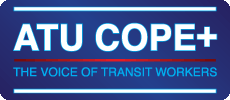Greyhound Drivers to Rally at Los Angeles Bus Terminal on Good Friday
Changes in Greyhound service are affecting employees and riders, and broader issues of social justice are behind this storm between ATU Local 1700 and the Dallas-based (and Scottish-owned) company.
Following is some background on the fight:
A few years ago, the inter-city bus industry segmented into what amounts to a separate and unequal world: Greyhound began marketing its brand to Anglos and “first class” passengers, and launched or bought “Mexican” subsidiaries like Americanos for migrants facing Post-9/11 travel security and riders who cared mainly about getting the cheapest fare possible.
Two events have reshaped that model: the economic meltdown pushed millions of Americans down the ladder, making inter-city buses a travel option again; and Wi-Fi made a long bus-ride tolerable (even enjoyable) for commuters and college kids with laptops and I-Pads.
Now Greyhound wants to tap the more upscale market by switching service on Dallas-Austin and Houston-Austin routes from Americanos to Greyhound. The drivers would be happy if this work were “coming back home,” and would even be ok with Greyhound assigning only bilingual drivers on these routes, even though it means many Anglo and Black employees won’t benefit directly.
The problem for bus drivers is that Greyhound still wants to pay the Americanos wage. We pointed out that every other employer pays bilingual workers a bonus, but they like paying 35% to 40% less than Greyhound drivers make.
And the problem for bus riders is they are being sold a ticket for Greyhound-level quality but are receiving Americanos-level service. There is a difference, and you don’t need to take our word or believe company advertising. The U.S. Department of Transportation recently created a mobile app, SaferBus, to rank carriers. Type in the two company names to reconfirm the truism that you get what you pay for. Or, in this case, that passengers are not getting what they paid for.
Greyhound is being dishonest. We’ll leave it to the National Labor Relations Board to decide if it’s also illegal. And we think the company’s treatment of Latino drivers reflects the same discriminatory attitude behind the earlier “segmented marketing” approach. It’s a long, ironic fall for an American icon that carried the Freedom Riders in the 1960s.







